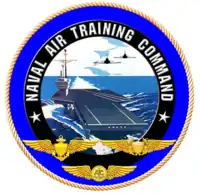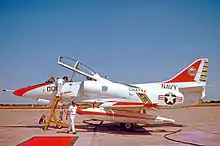Naval Air Training Command
The Naval Air Training Command (NATRACOM) is a one-star Echelon III command that conducts flight training of student Naval Aviators, and Naval Flight Officers. Though it does not conduct Naval Aircrew training which is conducted by Naval Education and Training Command's Naval Aviation Schools Command (NASC), it is responsible for monitoring the production of Aircrewmen through the Naval Aviator Production Process (NAPP). Through the NAPP, NATRACOM is also responsible for programming and monitoring the production of all (currently 19) Navy and Marine Corps Fleet Replacement Squadrons.
| Naval Air Training Command | |
|---|---|
 Logo of Naval Air Training Command | |
| Active | July 1972 - present (as Naval Air Training Command) |
| Country | |
| Branch | |
| Type | Training Command |
| Role | Flight training of Naval Aviators and Naval Flight Officers for the U.S. Navy, Marine Corps and Coast Guard |
| Headquarters | NAS Corpus Christi Corpus Christi, Texas, U.S. |
| Nickname(s) | "CNATRA", "TRACOM" |
| Flying hours | 301,532 (2016)[1] |
| Website | www |
| Commanders | |
| Commander | |
| Chief of Staff | CAPT Jeremy Rifas |
| Aircraft flown | |
| Fighter | F/A-18E/F Super Hornet (Blue Angels) |
| Trainer helicopter | TH-57B/C Sea Ranger |
| Trainer | T-6B Texan T-44C Pegasus T-45C Goshawk |
| Transport | C-130J Hercules (Blue Angels) |
It conducts operations aboard five Naval Air Stations in three states. The Mission of Naval Air Training Command is to train the world’s finest combat quality aviation professionals, delivering them at the right time, in the right numbers, and at the right cost.[2]
Commanded by RDML Richard T. Brophy, the Chief of Naval Air Training (CNATRA),[3] CNATRA and NATRACOM are headquartered on board Naval Air Station Corpus Christi, Texas. As recently as 2009, NATRACOM's 739 aircraft logged 358,449 flight hours, nearly a third of the Department of the Navy total for that fiscal year. To put those numbers in perspective, CNATRA flew 28% of the combined Navy and Marine Corps flight hours with 19% of the aircraft. In that same time more than 2,400 Naval Aviators, Naval Flight Officers (NFO) and Naval Aircrewmen earned their “Wings of Gold”.
Subordinate commands

CNATRA leads the Naval Air Training Command (NATRACOM) composed of five Training Air Wings. The five active wings are home to seventeen Training Squadrons, designated VT and HT squadrons.
- Training Air Wing One Tail Code "A" at NAS Meridian, Mississippi
- Training Air Wing Two Tail Code "B" at NAS Kingsville, Texas
- Training Air Wing Four Tail Code "G" at NAS Corpus Christi, Texas
- Training Air Wing Five Tail Code "E" at NAS Whiting Field, Florida
- VT-2 Doerbirds, Primary training in the T-6B Texan II
- VT-3 Red Knights, Primary training in the T-6B Texan II
- VT-6 Shooters, Primary training in the T-6B Texan II
- HT-8 Eightballers, Advanced training in the TH-57B/C Sea Ranger
- HT-18 Vigilant Eagles, Advanced training in the TH-57B/C Sea Ranger
- HT-28 Hellions, Advanced training in the TH-57B/C Sea Ranger
- Training Air Wing Six Tail Code "F" at NAS Pensacola, Florida
There were three Training Air Wings which have been disestablished (with assigned squadrons)
- Training Air Wing Three Tail Code "C" at the former NAS Chase Field, Texas: Disestablished 31 Aug 1992[4]
- VT-24 Bobcats: Disestablished
- VT-25 Cougars: Disestablished
- VT-26 Tigers: Disestablished
- Training Air Wing Seven Tail Code 2S until 1974,Tail Code F through 1976 disestablishment at the former NAS Saufely Field, Florida: Disestablished 1 Dec 1976[5]
- VT-1 Eaglets: Disestablished
- VT-5 Tigers: Disestablished
- Training Air Wing Eight at the former NAS Glynco, Georgia: Disestablished Aug 1974[6]
- VT-86 Sabrehawks: Transferred to Training Air Wing Six
- Disestablished or Deactivated other Training Squadrons
- VT-9(1st) Tigers: Established at Training Air Wing ONE, disestablished July 1987
- VT-23 Professionals: Established at Training Air Wing TWO, transferred to Training Air Wing ONE in 1994, deactivated 30 Sep 1999
- VT-29: Established at Training Air Wing FOUR, disestablished 31 Dec 1976 (was a land based multi-engine aircraft navigator training squadron)
CNATRA also oversees the Naval Flight Demonstration Squadron (NFDS) Blue Angels.
Naval Air Stations
NATRACOM conducts flight operations at the following Naval Air Stations:
Naval Aviation Enterprise (NAE)
The NATRACOM is part of the Naval Aviation Enterprise (NAE), reporting to Commander, Naval Air Forces.
See also
References
- "Chief of Naval Air Training | Mission".
- https://www.cnatra.navy.mil/mission.htm
- "Rear Admiral Westendorff". U.S. Navy Biographies. U.S. Navy. Retrieved 4 August 2020.
- Naval Aviation News Nov–Dec 1992 p. 7
- Naval Aviation News Jun 1977 p. 34
- Naval Aviation News Nov 1977 p. 29
External links
- Official site: https://www.cnatra.navy.mil/index.htm
